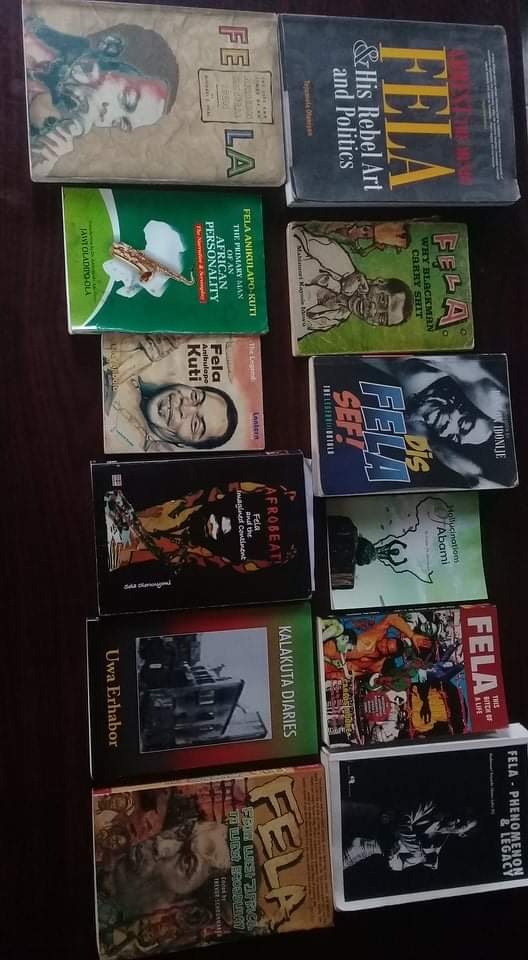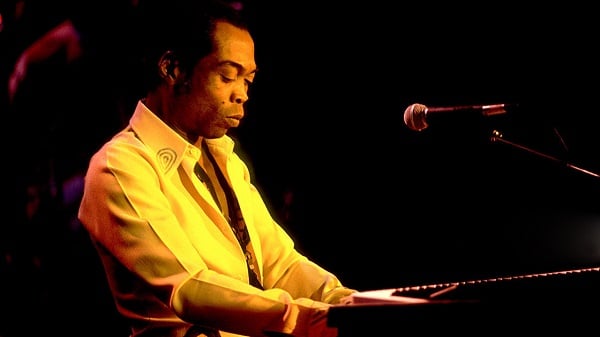BY VICTOR AKHIDENOR
I have 12 books on Fela Anikulapo-Kuti in my library.
Twelve? Yes, twelve! I know six plus two is eight according to the headline, however, there are four books I deliberately omitted for review.
One is a short play – Hallucinations of Abami – written by Victor Akhidenor. And by the way, that’s me. I can’t possibly review my own book, or can I?
“What do you call writing a review on your own book?” I asked 18-year-old Google. It came up with nothing. But 40+ year old me just found a word for it: Nepoview – a fusion of Nepotism and review. Age certainly counts!
Advertisement
Like my book, Jawi Oladipi-Ola’s Fela Anikulapo-Kuti: The Primary Man of an African Personality, is a screenplay. And for that reason, it won’t come under scrutiny.
The Legend: Fela Anikulapo-Kuti, a Lantern Books Heroes Series, a coffee book, is not on my list either. It might not be oversized, hard-covered, and pictorial like books categorised that way but it’s too elementary to be considered.
Fela: From West Africa to West Broadway is a good book on ‘one of the most crucial African figures of this age’. However, this work edited by Trevor Schoonmaker could only make the “ignored four” list because it’s only a collection of articles and interviews on the ‘20th century African musical icon and activist’.
Advertisement
No amount of activism can sway this decision!

So, let’s examine some of the books documenting the life, songs, tours, trials, travails and triumphs of the legend. Sadly, two of the books attempts to tell Fela’s story but fails woefully. But let us start on a bright note.
The Good
Advertisement
Fela: This Bitch of a Life by Carlos Moore is the oldest, so naturally, it comes first. This authorised biography of Africa’s musical genius is a masterpiece. First published in 1982 as Fela, Fela: This Bitch of a Life, Moore’s effort is the most referenced book on the Abami Eda.
This unique book – told mostly in Fela’s own words – explores the amazing journey of the brave pan-Africanist ‘who confronted multiple forces of oppression with the force of an imperishable music’. It is a must read for anybody interested in the life and times of Africa’s greatest musician.
Two books written by Mabinuori Kayode Idowu made this list – for good and for bad. We save the bad for the last!
Idowu, a member of Fela’s Young African Pioneers (YAP), wrote Fela: Why Blackman Carry Shit ‘out of a personal conviction that in order to be able to judge a man correctly, one has to have a deep knowledge of the man’.
Advertisement
In that regard, the book, which was first published in 1986, achieves its aim. It offers more insights to the earlier work by Moore and provides more pictures and historical background to the essence of Fela’s socio-political ideologies.
However, if you are on a lean budget and still want a book that will capture all you need to know about the Abami Eda, look no further than Fela: The Life and Times of an African Musical Icon written by a professor of Ethnomusicology, Michael E. Veal.
Advertisement
This book, published in the year 2000, is, by far, the best written on the music legend. The book demonstrates the author’s deep knowledge on Fela and the Nigerian music scene, delivering immense reading pleasure. No reader, whatever his like or dislike for the subject, could fail to be moved by the passion and intelligence of Veal. It’s a collector’s item.
First published in 2003, Afrobeat! Fela and the Imagined Continent by Sola Olorunyomi, has a feel of a doctoral thesis. In the words of the author, the book is a study on Fela’s ‘uncommon virtuosity and an exploration of his mystique’. Uncommon grammar!
Advertisement
In this book, Olorunyomi, a professor of African studies, explores Afrobeat as a musical practice and cultural politics. If you like books with serious touch backed up with solid scholarship, you will relish the author’s approach to the language. If not, you won’t go beyond the preface.
You will surely devour every page of Dis Fela Sef! The Legend(s) Untold by Benson Idonije – a book which deconstructs the Abami Eda-ness in the Abami Eda!
Advertisement
Who else can write credibly about Fela than a man who knew him from the start of his career to the end of his life? This memoir, published in 2016, is replete with anecdotes that can never be found in any book on the subject.
Also, if you want to read Fela’s last interview where the Abami Eda said… and also said… LOL! My friend, go and buy your copy!
Of the lot, Arrest the Music! Fela and his Rebel Art and Politics by Tejumola Olaniyan, is the most aesthetic!
As Stephen King famously remarked on book openings, the front cover of this book also says: “Listen. Come in here. You want to know about this.” And when you indeed enter its world, you are not disappointed.
First published in 2004, this lively study on the Abami Eda looks at the context, lyrics, instrumentation, visual art and people through which the music maestro produced his music.
The Bad
Taste in books is subjective. Notwithstanding, if you like Kalakuta Diaries by Uwa Erhabor, a 148-page book with its unattractive cover design, then you are a total … (fill the gap with an ‘I’ word)!
The author dedicates the book to the memories of Sola and Fehintola Anikulapo-Kuti. However, if these damsels were alive, they would sue Erhabor for unsolicited association with a bad product.
Poor grammar, spellings, and punctuations were compounded by poor story telling skills. It is the mother of awful books! Ooops…Did I just call it that? Read to the end (but then, I advise you toss this book with a great heave!).
And the Ugly
Fela – Phenomenon and Legacy by Mabinuori Kayode Idowu, is very bad that it’s ugly!
During his lifetime, Fela had an obsession for Igbo. This book, written after his demise, is obsessed with commas!
A comma indicates a pause between the ending of an introductory word, phrase, or clause, and the beginning of the main part of the sentence. That’s French to Idowu.
But then, the author has stayed in France for so many years that one can assume he wrote this book in French and used an online software to translate it to English.
That may excuse the overflowing commas as well as the poor spelling, grammar, tenses, punctuations, and the juxtapositions of American and English words that litter this “would have been great” book on the Abami Eda.
If this short review is not enough and you still want to read Idowu’s book because I know you are as curious as the cat, I wish you well.
If you are an employee, apply for a week’s leave. If, on the other hand, you are self-employed or an employer of labour, you will still need to set a week aside. Most importantly, make sure you are not home alone.
You can ignore my clarion call. But mark my words, your experience with this book will almost certainly lead to hospitalisation. You can “reject it in Jesus’ name” for all I care. But whether you like it or not, you will take the following week off work to recover from the shock of reading a poorly written work. In your best interest, apply for two weeks leave.
If Erhabor and his book are sentenced to five years behind bars, Idowu and his effort would be given a life sentence!
1 comments







Wetin happen, what has Idowu done to get this? And Erhabor, em collect your wife ni?